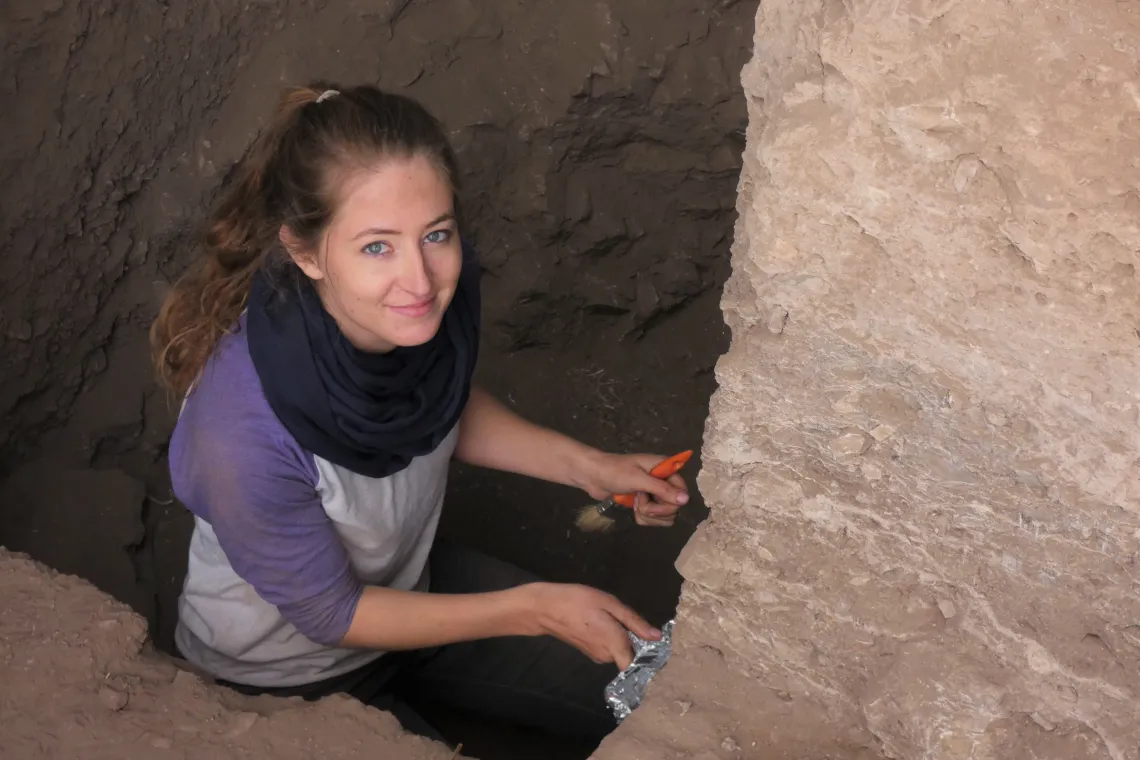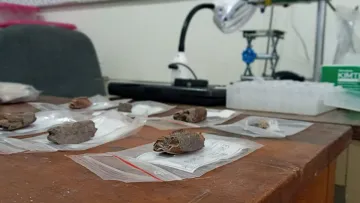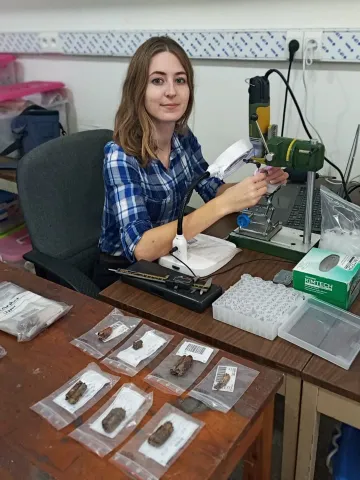Elevating Archaeology and Graduate Education: The Impact of a Profound Gift

Kayla Worthey at the archaeological site called Bizmoune Cave, located in Morocco. It is one of the Paleolithic sites she is studying for her dissertation. All photos by Ismael Sánchez Morales.
Since 2014, a generous estate gift from Dr. Keith A. Dixon has supported archaeology initiatives and graduate fellowships in the School of Anthropology. Recently, the school received another transformational donation, bringing the total gift to nearly $6.9 million. Dr. Dixon was a University of Arizona alumnus who received his master’s degree in anthropology in 1952.
Jim Krogmeier, associate vice president of gift planning at the University of Arizona Foundation, said the completion of the gift was the result of careful coordination. “Dr. Dixon worked carefully with his advisors and the UA Foundation Planned Giving team and SBS Development team to put his gift into place,” Krogmeier said. “Together, everyone found a way to achieve this tremendous charitable impact and also accomplish his individual financial and tax planning goals. It was truly a team effort.”
From its inception more than 100 years ago, the University of Arizona archaeology program has been a point of pride for the university, consistently ranking in the top five nationwide. Graduate students are essential linchpins to maintaining that quality — they help the school recruit top faculty and improve undergraduate education by providing support for hands-on learning. Because graduate fellowships are essential for recruiting top graduate students, Diane Austin, director of the School of Anthropology, says the Dixon gift has been transformative for the school.

Samples from the laboratory at the Institut National des Sciences de l’Archéologie et du Patrimoine, in Rabat, Morocco.
“I cannot overstate the value of this incredibly generous gift to our students, faculty and entire school,” Austin said. “This dedicated support for archaeology enables us to stretch undesignated resources to support students from our other programs.”
With student success and support as the priority, the gift is used in various ways: faculty research awards, education programs that complement activities such as field schools, and graduate and dissertation fellowships.
Faculty research awards provide a graduate assistant for the faculty member, stipend support for the assistant, and software or materials, if necessary. Students receive mentoring and learn research skills.
SUPPORTING ARCHAEOLOGY FIELDWORK AND MUSEUM COLLECTIONS MANAGEMENT
The Dixon funding also supports the processing of collections from past field schools held at the University Indian Ruin and the Silver Creek Archaeological Research Project, or SCARP, where graduate and undergraduate students received hands-on experience collecting data and learning about fieldwork.
Rebecca Harkness, a fifth-year anthropology Ph.D. student, is a research assistant with the Bureau of Applied Research in Anthropology at the Arizona State Museum. She oversees undergraduate students and instructs them in post-excavation tasks, which include organizing and transporting materials and data from the University Indian Ruin and SCARP field schools to the museum, followed by strict adherence to the museum’s collection cataloging method, which is resource-intensive. Harkness explained that Dixon’s gift directly supports this materials management and student instruction on how to work in a professional museum environment.
“Many of the field school collections don’t come with funding to take care of them,” Harkness said. “This gift allows me to step in and oversee collections with the help of undergraduate interns and get them to curation standards without using up staff resources.”
NURTURING RESEARCH AND DISSERTATION WRITING
In-depth research, peer and mentor collaboration, and significant contributions to the field come from graduate fellowships funded by donors like Dixon. The Keith A. Dixon Graduate Fellowship provides an incoming student with a full year of support, including a stipend, health insurance and tuition waiver. Most recipients go on to multi-year funding.
Students also need extra support at the end of their graduate careers. Writing a dissertation can be one of the most overwhelming facets of getting a Ph.D. degree. Diane Austin says students “often get bogged down in everything else they are doing,” to the point they struggle to devote consistent time to writing. The Keith A. Dixon Dissertation Write-Up Fellowship provides graduate students with some much-needed relief.

Kayla Worthey examines samples of animal teeth from the Rhafas archaeological site in Morocco.
Kayla Worthey is a fellowship recipient and anthropology Ph.D. student, currently writing her dissertation on paleoenvironmental reconstruction and the potential correlation between climate change and cultural shifts — through the analysis of animal teeth and snail shells from Morocco.
"The [fellowship] allows me the time to focus on a single task,” Kayla said. “More than just providing more hours in the day to complete a dissertation, I believe the fellowship is also greatly improving the depth and creativity of my work by creating a space in which I can spend longer spans of time thinking, asking questions and finding new ways to move forward in my analysis and writing.”
Kayla’s advisor, Regents Professor of Anthropology Mary Stiner, said funding for the end stage of graduate education, to work undistracted, is rare.
“Unfortunately, this final stage in graduate education is the least funded as a rule,” Stiner said. “Even very resourceful students who obtain financial support for their research from competitive grant programs often find themselves without financial support for the last big step — many quiet but intense months of writing and editing the dissertation. The Keith A. Dixon Dissertation Write-Up Fellowship is one of the few exceptions. Filling this gap in support for Ph.D. students is a wonderful investment in their future and a credit to the programs that trained them.”
##
This story was included in the fall 2023 Developments newsletter.

